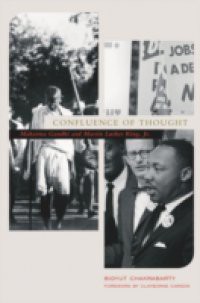While much has been written about the Mahatma Gandhi and Martin Luther King, Jr., never before has anyone compared the social and political origins and evolution of their thoughts on non-violence. In this path-breaking work, Bidyut Chakrabarty argues that there is a confluence between Gandhi and King's concerns for humanity and advocacy of non-violence, despite the very different historical, economic and cultural circumstances against which they developed their ideas. At the same time, he demonstrates that both thinkers were truly shaped by their historical moments, evolving their approaches to non-violence to best advance their respective struggles for freedom. Gandhi and King were perhaps the most influential individuals in modern history to combine religious and political thought into successful and dynamic social ideologies. Gandhi emphasized service to humanity while King, who was greatly influenced by Gandhi, pursued religion-driven social action. Chakrabarty looks particularly at the way in which each strategically used religious and political language to build momentum and attract followers to their movements. The result is a compelling and historically entrenched view of two of the most important figures of the twentieth century and a thoughtful meditation on the common threads that flow through the larger and enduring nonviolence movement.

